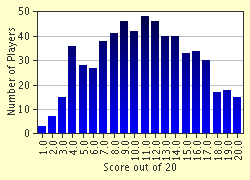Quiz Answer Key and Fun Facts
1. This individual composed a lengthy work on the rearing of children, though he abandoned all of his illegitimate children to orphanages.
2. A philosophic essay of his decided in the end that Sisyphus was indeed happy. Who was it?
3. What famous philosophical work deals with the allegory of the cave?
4. What French thinker is responsible for 'Cogito, ergo sum'?
5. What American philosopher wrote 'A Theory of Justice'?
6. What thinker is associated with the 'categorical imperative'?
7. What school of thought ascribes to the notion that there exist as many competing realities as there are individuals, thus absolutes can not exist?
8. Who wrote the 'Second Treatise on Civil Government'?
9. Which of the following is not a Platonic Dialogue?
10. Who is most correctly referred to as the father of utilitarianism?
11. Who wrote 'Being and Nothingness'?
12. What dramatist wrote the 'Philosophy of Existentialism'?
13. What communitarian wrote Democracy's Discontents?
14. Who wrote 'The End of History'?
15. What name was given to those allied with Alexander Hamilton in support of a strong national government with weak states?
16. What is the rule of the wealthy known as?
17. Who wrote an Enquiry Concerning Human Understanding?
18. 'Tis better to be feared than loved if you cannot be both' -- is in a great, and completely readable, work by whom?
19. Who is known as the founder of the deconstructionalist school of thought?
20. What philosopher fond of aphorisms suffered from syphilis and is often associated with the tenets of Nazi party?
Source: Author
LauraEmily
This quiz was reviewed by FunTrivia editor
gtho4 before going online.
Any errors found in FunTrivia content are routinely corrected through our feedback system.


